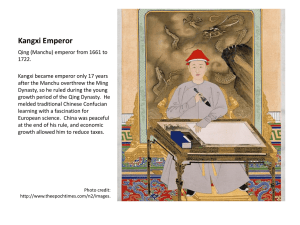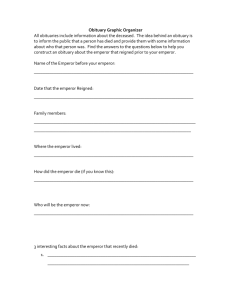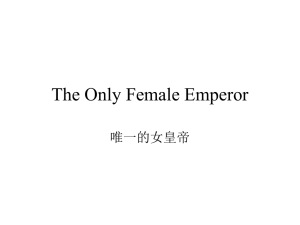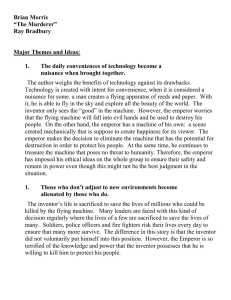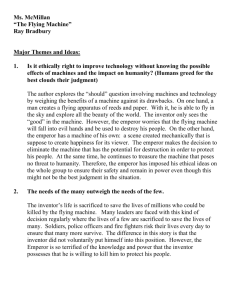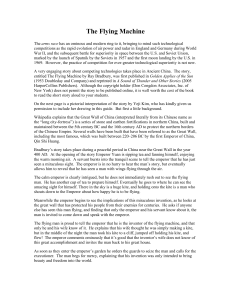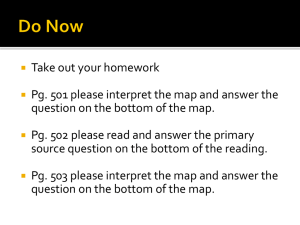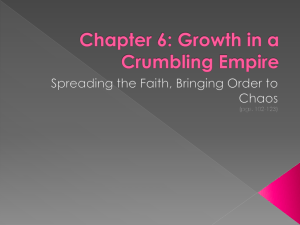Flying Machine Short Story Analysis - Themes & Characters
advertisement
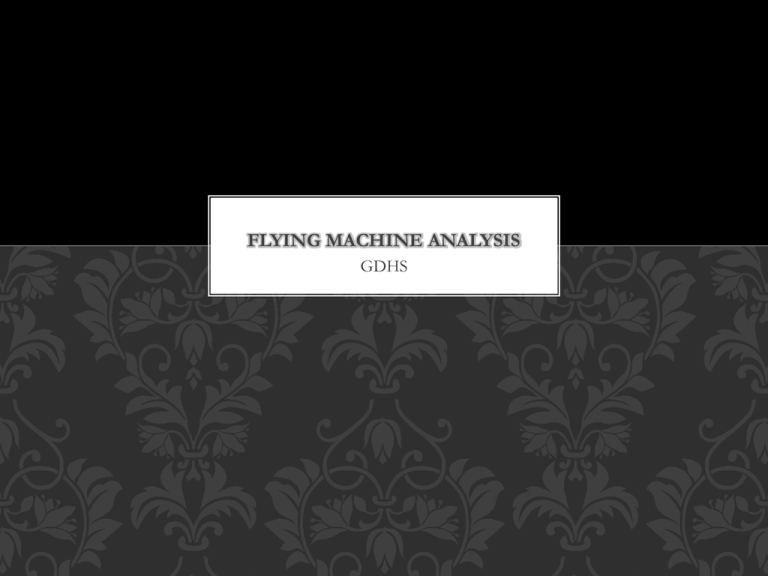
FLYING MACHINE ANALYSIS GDHS ANALYZING SHORT STORIES As a Senior high school student, your role has changed – you are now ready to begin TELLING us what you see rather than being TOLD what to see via questions and answers. Obviously, it will take some practice to reach the depth and detail required of a ENG 3U1 student, so we will start right away. MAJOR THEMES AND IDEAS: 1. Fantastic Machines A man creates a flying apparatus of reeds and paper. With it, he is able to fly in the sky. The inventor only sees the “good” in the machine. The emperor has a machine of his own: one of a mechanical scene to create happiness for its viewer. This scenario parallels the ethics that are sometimes ignored when technology is developed. In today’s society, the “should we” questions are ignored in favour of the excitement of creating something which could be used for good or evil. MAJOR THEMES AND IDEAS 2. Doomsday Scenario The emperor worries that the flying machine will fall into evil hands and be used to destroy his people. MAJOR THEMES AND IDEAS 3. Sacrifice The inventor’s life is sacrificed to save the lives of millions who could be killed by the flying machine. The servant, farmer and emperor must sacrifice reality (what they know is true and possible) in order to prevent evil. MAJOR THEMES AND IDEAS 4. Minds Unlimited The emperor is troubled by the “what if ” factor involved with the machine. He is afraid of the unknown and he will take great measures to ensure that no evil comes of the machine. SETTING The time period for this story is 400 A.D. (April 17). The place is the emperor’s palace in the countryside with the Great Wall of China nearby. The mood of the story is peaceful, serene and tranquil and it juxtaposes the natural world of the setting to the mechanical world of the inventor. MAJOR CHARACTERS 1. The Emperor of China (Yuan) in 400 A.D. He respects and enjoys the simple things in life. He is thoughtful and does not react to a situation before careful reflection. He is also fair when he spares the lives of the servants. The Emperor embodies the ethical dilemmas that a society must face when it questions whether technology should be introduced or enhanced. The Emperor sees the advantages and drawbacks of the machine but makes the decision to destroy it because of its potential threat to take lives. This attitude can be compared to contemporary scientists who often create things without ethics (for example, stem cell research, nuclear technology and cloning). MAJOR CHARACTERS 2. The Servant The servant is a loyal person to the throne. He is quick to report his findings to the emperor and he is patient and respectful towards the emperor’s hesitation and reflection regarding the machine. The servant is also smart enough to consider his self-preservation by promising never to speak of this creation again. MAJOR CHARACTERS 3. The Inventor The inventor is a man with much talent, but he only chooses to see how his invention will help him to enjoy life better than the potential for danger that his creation could trigger. He knows enough to ask for mercy from the emperor but he fails to see the harm his invention could cause. Therefore, he is narrow-minded and looks at his creation with tunnel-vision. PLOT 1. The incident that gets the plot rolling is the servant informing the emperor of his discovered miracle. The reader wonders what miracle could have occurred and continues to read on. 2. An interesting development is that the emperor reacts with horror instead of wonder when he sees the “miracle” for himself. It is unexpected that a person would have enough foresight to see the evils of such a wondrous creation. PLOT Another interesting development is the juxtaposition between the emperor’s music box and the flying machine. The emperor demonstrates that one should be cautious of an invention that creates such joy as the flying machine. 3. The climax of the story is the execution of the inventor. At this point, the major problem/conflict is resolved. A second climax could be when the life of the servant is spared. OPINION Answers will vary.
